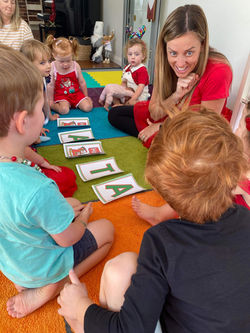
Benefits of Music
Music is a universal language that transcends boundaries and connects us on a profound level. Its ability to evoke emotions and express feelings is unparalleled. From the earliest days of human existence, people have used music as a means of communication, celebration, and self-expression.
The impact of music on child development is significant. It stimulates various areas of development, including intellectual, social-emotional, motor skills, language, and overall literacy. The connection between music and the mind is powerful, helping the body and mind work together in harmony. Early exposure to music is particularly beneficial as it aids in language acquisition by helping children learn the sounds and meanings of words.
It is a multifaceted discipline that incorporates elements of reading, math, history, science, and art. Music is a rich tapestry that weaves together different aspects of human knowledge and experience.
At Little House of Music, we are fostering a deep understanding of the significance of music in our lives and how to be the best human we can be.
_jfif.jpg)
“One good thing about music, when it hits you, you feel no pain.”
(Bob Marley)
"To teach a child an instrument without first giving him preparatory training and without developing singing, reading and dictating to the highest level along with the playing is to build upon sand."
(Zoltan Kodály)
"The music is not in the notes, but the silence between them"
(Wolfgang Amadeus Mozart)

"Music is the space between the notes"
(Claude Debussy)
_jfif.jpg)
"Music is to humans like flying is
to birds. We can't live without it"
(Fay White 2021)
"To play a wrong note is insignificant; to play without passion is inexcusable"
(Ludwig Van Beethoven)

Zoltan Kodály (1882-1967) was a Hungarian composer, educator, philosopher, and ethnomusicologist – a towering figure of the last century whose concept of music education has had remarkable influence worldwide. His main aim was to educate all society to read music as easily as reading words; to develop a love of music through experience and understanding; to discriminate between good music and bad music; and above all, to regard music as an integral part of life, placing the utmost importance on its role in education, just as the Greeks had done in the time of Pythagoras.
Pictures of our Classes
 |  |  |  |
|---|---|---|---|
 |  |  |  |
 |  |  |  |
 |  |  |  |
 |  |  |  |
 |
